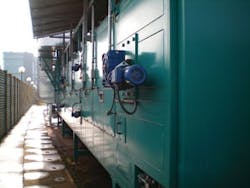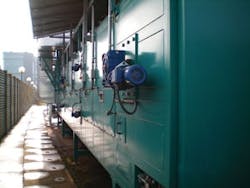Blumenauer introduces multi-billion dollar Water Trust Fund to rebuild, renew America
WASHINGTON, DC, July 15, 2009 -- Representative Earl Blumenauer (D-Ore) today introduced bipartisan legislation to establish a Water Trust Fund for investing in America's broken drinking water and sewage treatment systems. The "Water Protection and Reinvestment Act," H.R.3202, establishes a $10 billion annual fund for repairing America's corroded pipes and overburdened sewer systems, which pose serious health, environmental, and security consequences.
The $10 billion annual fund will create more than 250,000 jobs.
For more information on the water trust fund and how it will be paid for, see Rep. Blumenauer's Water Resources Protection Act Fact Sheet and Summary.
Following are statements from Rep. Blumenauer, members of Congress, and groups that joined the press conference to endorse this important legislation:
"When water mains are bursting through the streets, and sewage is leaking into our lakes, rivers, and streams, we have gotten past the point of out of sight out of mind," said Congressman Earl Blumenauer. "We know things are critical when, based on current funding levels, it would take Oregon more than 62 years to meet our current wastewater needs. Establishing a steady funding source to rebuild and renew America's outdated water infrastructure is a concrete step that puts us on the path to a healthier, more secure future. As we look for ways to jumpstart our economy, the Water Protection and Reinvestment Act will create hundreds of thousands of jobs while protecting the health of people and the environment. After many years of work, and numerous conversations with a multitude of stakeholders, I am proud to unveil this vital piece of legislation."
"I'm pleased to be an original cosponsor of Rep. Blumenauer's legislation, which will create a long overdue funding source for our deteriorating water infrastructure," said Congressman Steve LaTourette. "The EPA has stated that in Ohio alone $22 billion will be needed over the next 20 years to repair drinking water and wastewater infrastructure. This bill addresses these needs that exist across the country which currently leave local taxpayers with the bill."
"It is no secret to the people of Wisconsin that our aging wastewater infrastructure is increasingly being overwhelmed," said Congressman Tom Petri. "Last month as a result of rain, nearly 1 billion gallons of untreated sewage and storm water spilled out of Milwaukee-area sanitary and storm sewers into local rivers and Lake Michigan. Milwaukee is only a local example. The problem of inadequate and crumbling wastewater facilities is urgent and nationwide. The Wastewater Protection and Reinvestment Act is greatly needed if we are to have both reliable drinking water and wastewater treatment."
"Municipalities face serious challenges in meeting their clean water goals, including a growing population; aging infrastructure; increased regulatory requirements with stepped-up enforcement from EPA; and global competition driving up the cost of labor and materials," said Tom Walsh, who spoke on behalf of the National Association of Clean Water Agencies (NACWA). "We believe a clean water trust fund, such as the one that would be created by Congressman Blumenauer's bill, is critical to ensuring communities can continue to meet their Clean Water Act obligations."
"Every day we rely on seemingly invisible water and wastewater systems to support our quality of life and the nation's economy, and yet they suffer from inattention and underfunding," said American Society of Civil Engineers president D. Wayne Klotz. "A long-term, dedicated funding source, like the one proposed by Congressman Blumenauer, will go a long way in ensuring that these vital systems can continue to support the health and safety of the American people."
"A new economic study by the Clean Water Council demonstrates that water and wastewater projects generate tens of thousands of living-wage jobs, substantially increase demand for goods and services, and expand local tax bases," said Bill Hillman, CEO of the National Utility Contractors Association. "A long-term, self-sustaining and dedicated wastewater infrastructure trust fund would go a long way to reduce the structural investment gap that is creating an environmental crisis."
"We are at a transformational moment. The same old 19th and 20th century approaches to water management simply aren't fit for the challenges of this century," said Rebecca Wodder, president of American Rivers. "It is time to embrace a 21st century approach to water that integrates green solutions, recognizes changing climatic conditions, and helps ensure community safety and security. By supporting smart water infrastructure investments, the Trust Fund will help ensure a future of clean water for generations to come."
"In recent years funding for water infrastructure has suffered from neglect and misplaced priorities," said Mitch Jones, Senior Legislative and Policy Analyst for Food & Water Watch. "Even with the increases already approved by Congress, we will fall woefully short of our nation's need this year. We can't afford to rely on the whims of Congress and the change of administrations to guarantee the safety of our infrastructure. That's why we need a Water Protection and Reinvestment Fund."
"Communities in rural America desperately need this type of comprehensive and sustainable program that not only supports vital water and wastewater infrastructure, but also serves to improve public health and the prospect for future economic development opportunities," said Rural Community Assistance Partnership Executive Director Robert Stewart. "By providing a dedicated funding source, using existing delivery systems, and requiring a high level of responsibility and accountability from the utility recipients, the 'Water Protection and Reinvestment Act' will help ensure that this generation and those that follow us will be guaranteed safe, affordable and dependable water and wastewater services for their families and for future economic growth."
###

